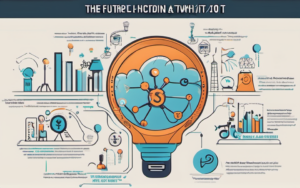The world is rapidly changing, fueled by the relentless march of emerging technologies. These innovations are transforming industries, shaping our lives, and driving us towards a future filled with both promise and uncertainty. Understanding the key trends in emerging technologies is crucial for businesses, individuals, and society as a whole. Let’s delve into some of the most exciting and impactful technologies shaping the future.
Artificial Intelligence (AI)
AI is already revolutionizing various sectors, from healthcare to finance. It’s about creating intelligent machines that can learn, reason, and solve problems like humans. The future of AI holds even more potential, with advancements in various subfields:
Machine Learning (ML)
ML enables systems to learn from data without explicit programming. This is driving advancements in areas like fraud detection, personalized recommendations, and predictive maintenance. Imagine systems that can learn from past data to anticipate potential problems in manufacturing or financial markets.
Deep Learning (DL)
A subset of ML, DL uses artificial neural networks to analyze vast amounts of data, enabling tasks like image recognition, natural language understanding, and self-driving cars. The ability to process complex information like human brains opens up exciting possibilities in diverse fields.
Natural Language Processing (NLP)
NLP allows computers to understand and process human language. This is transforming how we interact with technology, from voice assistants like Siri and Alexa to chatbot customer service. NLP-powered tools are enhancing communication, making information accessible to everyone.
Internet of Things (IoT)
The IoT is the network of interconnected devices, vehicles, and appliances that collect and share data. This technology is transforming how we live, work, and interact with our environment.
Smart Homes
Imagine homes that automatically adjust lighting, temperature, and security based on your preferences and habits. The IoT is turning homes into intelligent spaces, enhancing comfort, efficiency, and safety.
Smart Cities
Smart cities utilize sensors, data analytics, and connectivity to optimize resources like traffic flow, energy consumption, and public safety. The IoT is paving the way for sustainable, efficient, and citizen-centric urban environments.
Industrial IoT
The IoT is revolutionizing manufacturing, agriculture, and logistics. Connected sensors and devices enable real-time monitoring, predictive maintenance, and improved efficiency, leading to increased productivity and reduced costs.
Blockchain Technology
Blockchain is a decentralized, secure, and transparent ledger that records transactions across a network of computers. It’s gaining traction in various industries, offering a robust and secure platform for managing data and transactions.
Cryptocurrencies
Bitcoin, Ethereum, and other cryptocurrencies are built on blockchain technology, offering decentralized and secure digital currencies. This technology is disrupting traditional financial systems and creating new possibilities for payments, investments, and financial inclusion.
Supply Chain Management
Blockchain can track goods from origin to destination, providing real-time visibility and enhanced transparency. This improves efficiency, reduces fraud, and enables better inventory management, benefiting both businesses and consumers.
Decentralized Finance (DeFi)
DeFi applications leverage blockchain technology to create decentralized financial services, bypassing traditional intermediaries. This opens up new possibilities for lending, borrowing, and investing, democratizing access to financial services.
Virtual and Augmented Reality (VR/AR)
VR immerses users in simulated environments, while AR overlays digital information onto the real world. These technologies are creating new experiences in various sectors.
Gaming and Entertainment
VR and AR are revolutionizing gaming, offering immersive and interactive experiences. From exploring fantastical worlds to engaging in realistic simulations, these technologies are transforming how we play and entertain ourselves.
Education and Training
VR and AR can provide immersive learning experiences, enabling students to explore historical sites, perform medical procedures, or learn new skills in a safe and controlled environment. This enhances engagement and makes learning more interactive and effective.
Healthcare
VR and AR are transforming healthcare by enabling more effective diagnosis, treatment, and rehabilitation. Surgeons can practice complex procedures in virtual environments, patients can manage pain through immersive distractions, and therapists can provide virtual rehabilitation programs.
Biotechnology
Biotechnology is harnessing the power of biology to develop innovative solutions in healthcare, agriculture, and energy. This field is constantly evolving, with groundbreaking advancements in various areas:
Gene Editing
CRISPR-Cas9 and other gene editing technologies allow scientists to modify genes with unprecedented precision. This opens up possibilities for treating genetic diseases, improving crop yields, and developing new therapies.
Personalized Medicine
Biotechnology is enabling personalized medicine, tailoring treatments to individual patients based on their genetic makeup. This approach promises more effective and targeted therapies, reducing side effects and improving outcomes.
Bioprinting
Bioprinting uses 3D printing technology to create living tissues and organs. This groundbreaking technology holds the potential for revolutionizing organ transplantation, drug testing, and regenerative medicine.
Quantum Computing
Quantum computing utilizes the principles of quantum mechanics to solve complex problems that are beyond the capabilities of classical computers. This emerging technology has the potential to revolutionize various industries:
Drug Discovery
Quantum computers can analyze vast amounts of data to identify potential drug candidates and accelerate the drug discovery process. This could lead to faster development of new therapies and treatments for diseases.
Materials Science
Quantum computing can simulate the behavior of materials at the atomic level, enabling the design of new materials with enhanced properties. This could lead to breakthroughs in fields like energy storage, electronics, and aerospace engineering.
Financial Modeling
Quantum computers can perform complex financial simulations, enabling more accurate risk assessments and portfolio optimization. This could revolutionize investment strategies and financial markets.
Impact on Society
Emerging technologies are shaping our society in profound ways, impacting everything from education and healthcare to employment and the environment. These technologies have the potential to improve our lives in countless ways, but it’s crucial to address the ethical challenges they present.
Ethical Considerations
As emerging technologies become more powerful and pervasive, ethical considerations become increasingly important. We must ensure that these technologies are developed and used responsibly, addressing issues like data privacy, algorithmic bias, and job displacement.
Future Outlook
The future of emerging technologies is bright, with endless possibilities for innovation and progress. However, it’s essential to approach this future with a balanced perspective, embracing the potential benefits while addressing the challenges responsibly. By fostering collaboration, investing in research, and promoting ethical development, we can harness the power of emerging technologies to build a better future for everyone.




